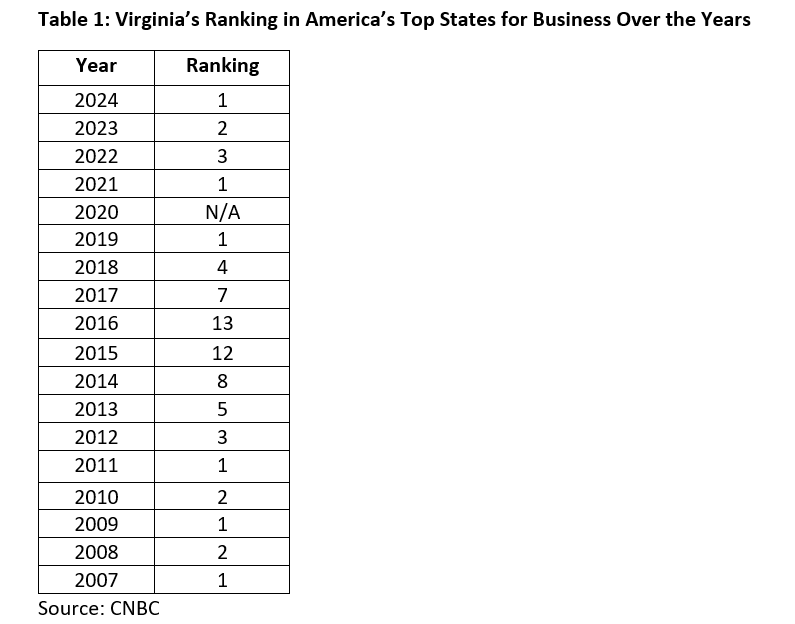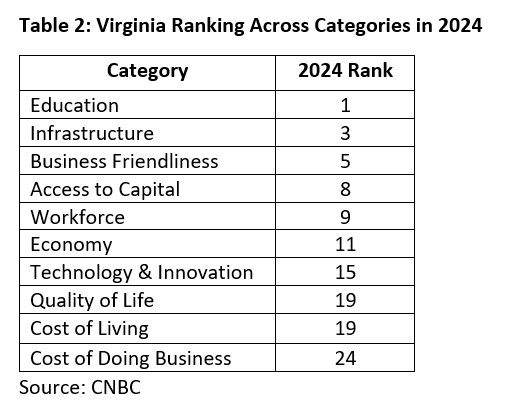Breaking Down the Ranking: Virginia Top State for Business
August 14, 2024

CNBC released its annual rankings of America’s Top States for Business in 2024 last month. Virginia ranked first in the list of 50 states across 10 broad categories of competitiveness, inching up from second place in the rankings last year. This is the sixth time in the 18-year history of these rankings that Virginia has emerged as the best state for business in the country. Let’s understand which categories contributed most towards Virginia’s top score and which ones have scope for improvement in the coming years.

Top scoring categories: Education (Grade: A+), Infrastructure (Grade: A), Business Friendliness (Grade: B+)
Virginia ranked the highest in terms of education (quality of K-12 education, number of colleges and universities, as well as presence of community colleges), which proves the advantage that the state provides to businesses in making decisions about where to establish their operations. Moreover, infrastructure, which is the most highly weighted category this year, was another top category for Virginia. This signifies the strength that Virginia has built over the years in terms of its transportation system, broadband service, utility infrastructure, availability of vacant land and office and industrial space, as well as its readiness to face the effects of climate change. Business friendliness, in which Virginia ranked quite high, attracts many businesses since they want to minimize legal and regulatory burdens as well as ensure an abundance of support towards emerging industries.
Medium scoring categories: Access to Capital (Grade: B+), Workforce (Grade: C+), Economy (Grade: B-), Technology & Innovation (Grade: B+)
Access to capital, while being a small share of the total ranking score, measures how easy it is for companies to secure financing in the state through various sources such as traditional bank loans, venture capital investments, and state-backed programs. The workforce category has dipped in its ranking from seventh last year to ninth this year. Businesses move their operations to places with a workforce that will meet their needs. Many of the firms located in Virginia are in the professional and technical services sector, which tends to seek well-educated and high-skill workers. More efforts should be directed towards attracting talent at all levels and retaining it in the state. Virginia’s ranking in the economy category puts it in a better position compared to most states. Companies seek states with stable finances and solid economies, so this is good news for Virginia’s overall business attractiveness. Virginia’s prowess in the education category makes it a great possible hub for Technology and Innovation. The commonwealth can direct its resources towards supporting innovative endeavors to improve its ranking in the category.
Low scoring categories: Quality of Life (Grade: C+), Cost of Living (Grade: C+), Cost of Doing Business (Grade: B)
Quality of life and cost of living are among the bottom three categories within Virginia’s ranking score. While the ranking for cost of living has improved since last year, quality of life has dipped further down in the ranking across different states. Ultimately, these two factors play a major role in people’s decision about living in a specific state or moving away, and businesses want to be where there is good talent. Increasing housing costs and low housing inventory levels can play a detrimental role in worsening Virginia’s standing in these categories. They could also possibly have long-term effects on Virginia’s attractiveness to businesses and the retention of our workforce. Lastly, cost of doing business is the lowest ranked category for Virginia, but it has improved significantly since last year. Companies will continue to prefer states that are business-tax friendly and that provide incentives which reduce business costs while making business decisions.

Virginia’s recent laurel as the best state for business in the United States is the result of many investments made over the years. While this current ranking is worth celebrating, continued efforts are needed to maintain this standing and focus the commonwealth’s initiatives towards areas that need improvement.
For more information on housing, demographic and economic trends in Virginia, be sure to check out Virginia REALTORS® other Economic Insights blogs and our Data page.
You might also like…
NAREB 2024 State of Housing in Black America
By Dominique Fair - February 19, 2025
In 1926, a historian named Carter G. Woodson started Black History Week, which would expand to Black History Month in 1976. Its purpose is to highlight the achievements… Read More
Virginia’s Ranks 17th for In-Migration in the United States
By Sejal Naik - February 18, 2025
Every year, U-Haul releases a ranking of U.S. states based on their estimates of growth in population since the prior year. This ranking helps understand the net influx… Read More
Virginia’s Thriving Labor Market in 2024
By Abel Opoku-Adjei - February 3, 2025
The labor market in the U.S. showed resilience in 2024 despite the looming economic uncertainty amongst many Americans. According to the recent Bureau of Labor Statistics data, approximately… Read More